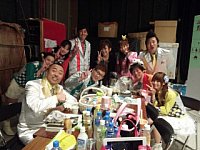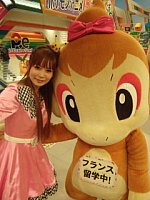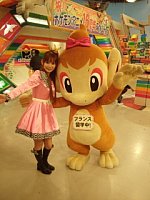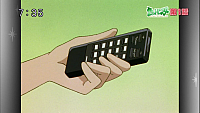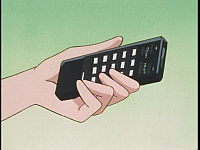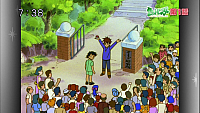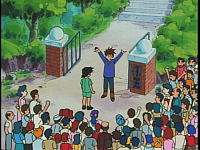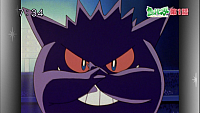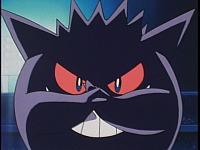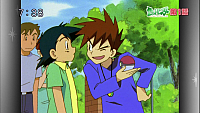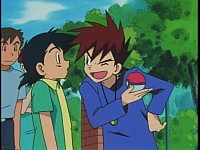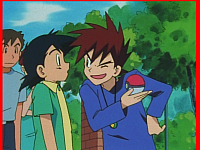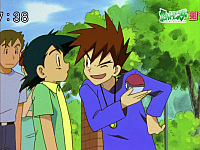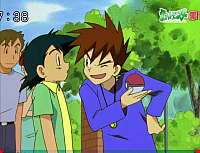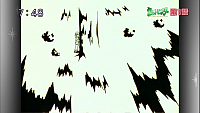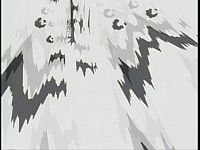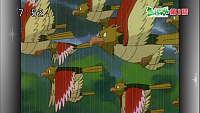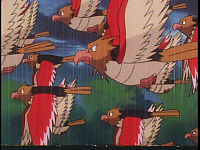On March 6th, 2012, Shoko Nakagawa posted three pictures on her blog that showed a banner on the Pokémon Smash set that said: Pokémon Anime 15th Anniversary Special (ポケモンアニメ15周年スペシャル). On Sunday April 1st, 2012's episode of Pokémon Smash, Pokémon! I Choose You! (Digitally Remastered Version) / A Special Celebrating the 15th Anniversary of the 'Pokémon' anime, with an Appearance from Rica Matsumoto! / A Feature of 15 Years Worth of Movies / The Dearly Missed Pokémon Join the Celebration! (ポケモン!きみにきめた! (デジタルリマスター版) / アニメ「ポケモン」15周年記念スペシャル、松本梨香さんが登場! / 15年間の映画情報 / 懐かしいポケモンたちがお祝いに!), a special episode was broadcast which was also the exact anniversary date of the anime which began airing in Japan on April 1st, 1997. Shoko-tan posted back stage pictures with the Pokémon Smash cast and Rica Matsumoto (松本梨香) who appeared in the special. Hikozaru also was reunited with Shoko-tan.
Source: http://ameblo.jp/nakagawa-shoko/entry-11184556192.html
After the episode airing, the announcer explained that today's episode is a 15th Anniverary Special for the anime, and how they'll look back at 15 years of adventure together with their special guests. As we cut back to the hosts, they introduce the special properly with banners and posters, and Golgo calls on the first guests: Pikachu and Gonbe. Robert greet their old friend Gonbe, and the announcer explains how he used to work with them earlier. Golgo introduces the next guest as an obvious participant at this celebration, and calls in Rica Matsumoto herself, and Shoko-tan bows down and praises her.
The crew starts listing various key points about the anime: It started airing April 1st 1997, as of today a total of 736 episodes have aired, the highest viewership rating it got was 18.6%, and it currently airs in 77 countries. Additionally, the first opening theme, Matsumoto's "Mezase Pokémon Master" is not only a million seller, but a double million seller, which leads her to perform that very song for the audience.
Next up is the first installment of a segment titled "the Pokémon Anime Playback", which shows various clips from the anime in a manner very similar to the "Strange and Cool Pokémon Plays" segments from the Weekly Pokémon Broadcasting Station show. In the first of these segments, which focuses on Satoshi, we see him dressing up in various manners and being hit by various Pokémon moves.
As we cut back to the studio, Golgo notices that Rica sees to have hidden herself behind a curtain. Throwing it aside, he discovers his old friend Yamirami is there instead, and as the two greet each other, the narrator explains how Yamirami used to work with Golgo and how great friends they were. As Rica reveals herself, having been standing just outside of camera range, Shoko-tan starts explaining the series' history using a giant billboard full of illustrations and references. The crew explains and shows clips referencing the various key aspects of each of the four series, "Pocket Monsters", "Pocket Monsters Advanced Generation", "Pocket Monsters Diamond & Pearl" and "Pocket Monsters Best Wishes", covering aspects such as which region they took place in and who Satoshi's travelmates were. Pochama's popularity as a cast member of Diamond & Pearl is brought up, leading into the introduction of the next guest: Pochama itself.
Another installment of the Pokémon Anime Playback follows, this one focusing on Pikachu, and shows off its power, its (lack of) speed, its love for ketchup and its knack for making amusing faces, as well as its amazing Pokémon mimicry skills.
As the show returns from its commercial break, Robert have prepared a new segment, focusing on several "secret" facts about Satoshi. The first point they bring up is the similar personalities the Pokémon of the same type seem to have. Waninoko and Mijumaru, both Water types, are fun-loving and do things their own way, his Fushigidane and Tsutarja, both Grass types, are serious, no-nonsense Pokémon, and his Fire type Pokémon Pokabu and Hikozaru were both met through dramatic circumstances and were both characters with traumatic histories. This coverage of Satoshi's Pokémon leads them to introduce the next two guests, Leader Kimori and Hikozaru, and the narrator explains how Robert and Shoko-tan used to work with them in the past. As the two Pokémon leave, Robert bring up their next "secret" - Satoshi's amazing strength, which is demonstrated by showing him carrying the 6kg Pikachu on his head while both running at high speeds and jumping great distances, and further by lifting the 49.5kg Hippopotas both in his arms and, again, on his head.
Next we get another Pokémon Anime Playback installment, this one focusing on the Rocket Gang, in particular their various disguises, including Kojiro's Professor Red disguise and Nyarth's Chief Golgo disguise, as well as a showcase of some of their different mechs. As the segment ends, the next guest walks in on his own - it's Nyarth himself, in his first appearance on Pokémon Smash.
Robert asks Rica if she'd be interested in doing a dubbing skit with them, and she agrees, which launches a parody dub of select scenes from the Tornelos VS Voltolos VS Landlos episodes, with Rica voicing Satoshi, Baba voicing Tornelos, Yamamoto voicing Voltolos and Akiyama voicing Landlos, all recorded right there on the spot, as the apparantly partly improvised dialogue changes the Pokémon's battle into one over who ate Landlos' cake.
As the show returns from another commercial break, the International Division introduce their personal segment, a presentation of the 14 Pokémon movies that have been made to date, co-hosted by two new guests, Director Lucario and the Jagged-Eared Pichu. Following this presentation, the girls bring up the latest information of "Kyurem VS the Sacred Swordsman Keldeo", which will debut July 14th: The movie will again have a poster design contest, where Japanese kids can download the black-and-white basic poster design from the official site and design a poster featuring an uplifting message for the people of Japan. The three girls and Shoko-tan show off the example posters they have designed.
Golgo then announces the secret project that has been mentioned a couple times - a 15th Anniversary Roleplay Contest, where Robert as "Team Meloetta" and the International Division as "Team Keldeo" will be competing against each other through viewer support, similar to the Black-White Cheering Showdown from last year. Viewers are given a list of movie Pokémon connected to each team, and can then earn points for the team by sending in pictures of themselves portraying one of these Pokémon. The episode then ends with Rica and the PokéSma crew doing a performance of "Best Wishes" together.
The over the air version from TV Tokyo 7, in which this comparison is based off of, broadcasts digitally with a NTSC resolution of 1440x1080, with an aspect ratio flag set to 16:9 and a frame rate of 29.97. While the episode is actually 4:3 and is pillerboxed, the video for the episode has an effective resolution of 960x720. The DVD's resolution is NTSC 720x480, 4:3, 29.97fps. It is quite evident from the remastered broadcast that it was mastered in high definition as the original film is more than sufficient to support high definition. While the OTA resolution and bitrate is not nearly as high as it is possible with Blu-ray, an eventual home release on Blu-ray could correct resolution and bitrate issues. The film grain is a lot more evident in the remastered version but this is very common with shows originally mastered on film and then viewed in high definition.
On September 23rd, 2010, during the Best Wishes debut celebration, Pokémon! I Choose You! (ポケモン!きみにきめた!) aired in the special It's About to Start! It's a Pokémon Festival! Best Wishes (8:00) (もうすぐスタート! ポケモン祭りだ! ベストウイッシュ (8:00) on TV Tokyo. While the special was broadcast in high definition, the episode was clearly still in standard definition as comparing this special broadcast to the remastered broadcast clearly shows a difference.
Later in the episode, the Japanese text on Okido's gate is a lot easier to read. The kanji in "Okido Laboratories" (オーキド研究所) is also easier to see.
A color balance and color correction is also clearly evident throughout the remastered version. Gangar's color is more vibrant and the contrast is greatly improved.
The remastering process seems to have scanned in the full frame as the DVD version in comparison is cropped left, top and right. The broadcasted digitally remastered version though seems to have cropped the full frame off a bit at the bottom, possibly to help remove the blackness at the bottom at scene change frames. The Shigeru/Satoshi scene outside the lab is a good place that shows this. In the remastered version, more of the man on the left can be seen and it shows that the tree on the right splits half way up. In the DVD version though, more of Satoshi's arms can be seen as well as the pants of the man on the left.
A direct frame line up from the DVD upscale to match the remastered version shows the difference. The frame on the left is the DVD upscaled frame. The red border is the part of the picture that is in the remastered version but not in the DVD version. The middle frame is what the remastered frame looks like. The frame on the right is the remastered frame with the bottom part of the upscaled DVD version added. The red part in the right frame is the missing part of the full frame scan.
Ghosting from the DVD encoding process is now gone in the remastered version. Reverse Telecine (IVTC) could not fix this issue with the DVD and deinterlacing made it even worse.
Scene change frames that had blackness at the bottom caused by the original telecine process or tape, have been removed from the remastered version. This was one of the most annoying things about watching the original series and it makes it a more enjoyable viewing experience with it being removed.
Source: http://ameblo.jp/nakagawa-shoko/entry-11184556192.html
Pokémon 15th Anniversary Special Episode Summary
After introducing the various segments making up today's episode, the show's announcer started it off with the words "Good morning! We will celebrate 15 years of Pokémon TV series! It's time for Pokémon Smash!" After Golgo, Shoko-tan, Robert and the International Division collectively greeted the viewers with a "Pokémorning!", Golgo mentioned that today was April 1st, and asked the others if they knew what day that was. Hana said it was April fool's day, and Golgo answered that while that's true, it's also a Pokémon-related commemoration day. Maria suggests it's the day Akiyama started playing Pokémon and got fat, while Baba suggests it's the day the Pokémon Center got listed on the stock market. Golgo can't believe they don't know and asks Shoko-tan to tell them, and she explains how, on this date, 15 years ago, the very first episode of the Pocket Monsters anime was broadcast. Right after she says this, Professor Red walks in with a package, explaining how the digitally remastered version of the first Pocket Monsters episode is finally complete. After he shows a clip from the old version and a clip from the new version played side by side to highlight the differences, Golgo explains that they'll show this digital remaster right now, propting Red to use a special go-to phrase: "OK! Digital Remaster!"After the episode airing, the announcer explained that today's episode is a 15th Anniverary Special for the anime, and how they'll look back at 15 years of adventure together with their special guests. As we cut back to the hosts, they introduce the special properly with banners and posters, and Golgo calls on the first guests: Pikachu and Gonbe. Robert greet their old friend Gonbe, and the announcer explains how he used to work with them earlier. Golgo introduces the next guest as an obvious participant at this celebration, and calls in Rica Matsumoto herself, and Shoko-tan bows down and praises her.
The crew starts listing various key points about the anime: It started airing April 1st 1997, as of today a total of 736 episodes have aired, the highest viewership rating it got was 18.6%, and it currently airs in 77 countries. Additionally, the first opening theme, Matsumoto's "Mezase Pokémon Master" is not only a million seller, but a double million seller, which leads her to perform that very song for the audience.
Next up is the first installment of a segment titled "the Pokémon Anime Playback", which shows various clips from the anime in a manner very similar to the "Strange and Cool Pokémon Plays" segments from the Weekly Pokémon Broadcasting Station show. In the first of these segments, which focuses on Satoshi, we see him dressing up in various manners and being hit by various Pokémon moves.
As we cut back to the studio, Golgo notices that Rica sees to have hidden herself behind a curtain. Throwing it aside, he discovers his old friend Yamirami is there instead, and as the two greet each other, the narrator explains how Yamirami used to work with Golgo and how great friends they were. As Rica reveals herself, having been standing just outside of camera range, Shoko-tan starts explaining the series' history using a giant billboard full of illustrations and references. The crew explains and shows clips referencing the various key aspects of each of the four series, "Pocket Monsters", "Pocket Monsters Advanced Generation", "Pocket Monsters Diamond & Pearl" and "Pocket Monsters Best Wishes", covering aspects such as which region they took place in and who Satoshi's travelmates were. Pochama's popularity as a cast member of Diamond & Pearl is brought up, leading into the introduction of the next guest: Pochama itself.
Another installment of the Pokémon Anime Playback follows, this one focusing on Pikachu, and shows off its power, its (lack of) speed, its love for ketchup and its knack for making amusing faces, as well as its amazing Pokémon mimicry skills.
As the show returns from its commercial break, Robert have prepared a new segment, focusing on several "secret" facts about Satoshi. The first point they bring up is the similar personalities the Pokémon of the same type seem to have. Waninoko and Mijumaru, both Water types, are fun-loving and do things their own way, his Fushigidane and Tsutarja, both Grass types, are serious, no-nonsense Pokémon, and his Fire type Pokémon Pokabu and Hikozaru were both met through dramatic circumstances and were both characters with traumatic histories. This coverage of Satoshi's Pokémon leads them to introduce the next two guests, Leader Kimori and Hikozaru, and the narrator explains how Robert and Shoko-tan used to work with them in the past. As the two Pokémon leave, Robert bring up their next "secret" - Satoshi's amazing strength, which is demonstrated by showing him carrying the 6kg Pikachu on his head while both running at high speeds and jumping great distances, and further by lifting the 49.5kg Hippopotas both in his arms and, again, on his head.
Next we get another Pokémon Anime Playback installment, this one focusing on the Rocket Gang, in particular their various disguises, including Kojiro's Professor Red disguise and Nyarth's Chief Golgo disguise, as well as a showcase of some of their different mechs. As the segment ends, the next guest walks in on his own - it's Nyarth himself, in his first appearance on Pokémon Smash.
Robert asks Rica if she'd be interested in doing a dubbing skit with them, and she agrees, which launches a parody dub of select scenes from the Tornelos VS Voltolos VS Landlos episodes, with Rica voicing Satoshi, Baba voicing Tornelos, Yamamoto voicing Voltolos and Akiyama voicing Landlos, all recorded right there on the spot, as the apparantly partly improvised dialogue changes the Pokémon's battle into one over who ate Landlos' cake.
As the show returns from another commercial break, the International Division introduce their personal segment, a presentation of the 14 Pokémon movies that have been made to date, co-hosted by two new guests, Director Lucario and the Jagged-Eared Pichu. Following this presentation, the girls bring up the latest information of "Kyurem VS the Sacred Swordsman Keldeo", which will debut July 14th: The movie will again have a poster design contest, where Japanese kids can download the black-and-white basic poster design from the official site and design a poster featuring an uplifting message for the people of Japan. The three girls and Shoko-tan show off the example posters they have designed.
Golgo then announces the secret project that has been mentioned a couple times - a 15th Anniversary Roleplay Contest, where Robert as "Team Meloetta" and the International Division as "Team Keldeo" will be competing against each other through viewer support, similar to the Black-White Cheering Showdown from last year. Viewers are given a list of movie Pokémon connected to each team, and can then earn points for the team by sending in pictures of themselves portraying one of these Pokémon. The episode then ends with Rica and the PokéSma crew doing a performance of "Best Wishes" together.
Pokémon! I Choose You! (ポケモン!きみにきめた!) - Digitally Remastered Version
Until the remastered version of Pokémon! I Choose You! (ポケモン!きみにきめた!) aired in Pokémon Smash 78, the highest quality version of the episode was available on DVD in the Pokémon Best Collection DVD Kanto Volume (1) (ポケモンベストコレクションDVD カントー編(1). The quality difference between the two is very evident and the episode has never looked better. Gone are various defects caused by the inital transfer of the episode from its original film version to a broadcastable version.The over the air version from TV Tokyo 7, in which this comparison is based off of, broadcasts digitally with a NTSC resolution of 1440x1080, with an aspect ratio flag set to 16:9 and a frame rate of 29.97. While the episode is actually 4:3 and is pillerboxed, the video for the episode has an effective resolution of 960x720. The DVD's resolution is NTSC 720x480, 4:3, 29.97fps. It is quite evident from the remastered broadcast that it was mastered in high definition as the original film is more than sufficient to support high definition. While the OTA resolution and bitrate is not nearly as high as it is possible with Blu-ray, an eventual home release on Blu-ray could correct resolution and bitrate issues. The film grain is a lot more evident in the remastered version but this is very common with shows originally mastered on film and then viewed in high definition.
On September 23rd, 2010, during the Best Wishes debut celebration, Pokémon! I Choose You! (ポケモン!きみにきめた!) aired in the special It's About to Start! It's a Pokémon Festival! Best Wishes (8:00) (もうすぐスタート! ポケモン祭りだ! ベストウイッシュ (8:00) on TV Tokyo. While the special was broadcast in high definition, the episode was clearly still in standard definition as comparing this special broadcast to the remastered broadcast clearly shows a difference.
Mastering Changes
The obvious change as stated above is the resolution change. The mastering into high definition gives a lot more detail to the episode than the previous master. This is most evident when looking at text in the episode which is easier to read. The text on the remote in Hanako's hand is a good example of this.Later in the episode, the Japanese text on Okido's gate is a lot easier to read. The kanji in "Okido Laboratories" (オーキド研究所) is also easier to see.
A color balance and color correction is also clearly evident throughout the remastered version. Gangar's color is more vibrant and the contrast is greatly improved.
The remastering process seems to have scanned in the full frame as the DVD version in comparison is cropped left, top and right. The broadcasted digitally remastered version though seems to have cropped the full frame off a bit at the bottom, possibly to help remove the blackness at the bottom at scene change frames. The Shigeru/Satoshi scene outside the lab is a good place that shows this. In the remastered version, more of the man on the left can be seen and it shows that the tree on the right splits half way up. In the DVD version though, more of Satoshi's arms can be seen as well as the pants of the man on the left.
A direct frame line up from the DVD upscale to match the remastered version shows the difference. The frame on the left is the DVD upscaled frame. The red border is the part of the picture that is in the remastered version but not in the DVD version. The middle frame is what the remastered frame looks like. The frame on the right is the remastered frame with the bottom part of the upscaled DVD version added. The red part in the right frame is the missing part of the full frame scan.
Ghosting from the DVD encoding process is now gone in the remastered version. Reverse Telecine (IVTC) could not fix this issue with the DVD and deinterlacing made it even worse.
Scene change frames that had blackness at the bottom caused by the original telecine process or tape, have been removed from the remastered version. This was one of the most annoying things about watching the original series and it makes it a more enjoyable viewing experience with it being removed.
Episode changes as a result of the Remastering Process
Various small changes to the episode have been incorporated in the remastered version. It is obvious that some of these changes were originally intended to be shown but the original master had transfer problems. Below is a list of these changes and they can also be found in our episode guide edit list for this episode.| Timecode | Description | Image(s) |
|---|---|---|
| 02:50 | In the Digitally Remastered version, the red and white background is actually animated and flickers around Satoshi. The Japanese DVD has a static background. |
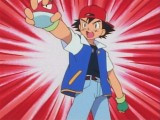

|
| 07:16 | In the Remastered version, when Pikachu comes out of its monster ball, the animation was redone to make it flicker faster than the DVD version. |
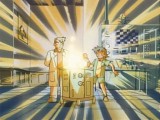

|
| 07:33 | In the Remastered version, when Pikachu shocks Satoshi, the animation was redone to make the frame changes cleaner than the DVD version. |
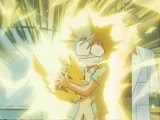

|
| 07:48 | In the Remastered version, when Pikachu shocks Satoshi and Okido, the animation was redone to make the frame changes cleaner than the DVD version. In the DVD version, their skeletons are only seen twice in the sequence and barely visible whereas the remastered version their skeletons are quite clear and are visible far more often. |
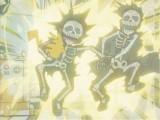

|
| 19:35 | In the Remastered version, when Pikachu jumps up and uses his Thunderbolt attack, the animation is a lot cleaner and movement in the bolt can be seen which is not very evident in the DVD version. |


|
| 20:20 | In the Remastered version, Ho-oh's sparkles completely dissipate before the scene change fade but in the DVD version they continue through the fade transition for a few seconds. The sparkles are also golden in the remastered version while they are white in the DVD version. |
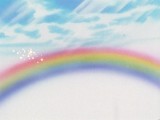

|
Related Articles
- 22 Aug 2025 Pocket Monsters Episode: Mega Evolution
- 20 Aug 2025 Pokémon Horizons: Season 2 The Search for Laqua Part 4 on Netflix in the US on September 26th, 2025
- 21 May 2025 Pokémon Horizons: Season 2 The Search for Laqua Part 3 on Netflix in the US on June 27th, 2025
- 18 Apr 2025 TOMY - Pocket Monsters Plushies Roy's Alternate-colored Lucario / Mega Lucario
- 17 Apr 2025 TOMY - Pocket Monsters Plushie Captain Pikachu Goggles Ver.
- 04 Apr 2025 Pokémon GO - Pokémon Horizons: The Series Celebration Event - Tinkatink, Tinkatuff & Tinkaton Debuts
- 26 Mar 2025 Pokémon Horizons: Season 2 The Search for Laqua Part 2 on Netflix in the US on April 25th, 2025
- 21 Mar 2025 Pocket Monsters: Mega Voltage
- 14 Mar 2025 Pocket Monsters - Mega Voltage
- 27 Feb 2025 Pokémon Day 2025 - Pokémon Presents Video Presentation
